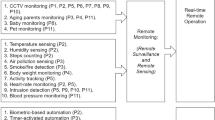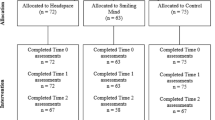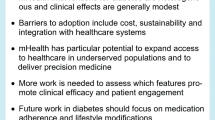Abstract
Mobile applications (apps) can be very useful software on smartphones for all aspects of people’s lives. Chronic diseases, such as diabetes, can be made manageable with the support of mobile apps. Applications on smartphones can also help people with diabetes to control their fitness and health. A systematic review of free apps in the English language for smartphones in three of the most popular mobile app stores: Google Play (Android), App Store (iOS) and Windows Phone Store, was performed from November to December 2015. The review of freely available mobile apps for self-management of diabetes was conducted based on the criteria for promoting diabetes self-management as defined by Goyal and Cafazzo (monitoring blood glucose level and medication, nutrition, physical exercise and body weight). The Preferred Reporting Items for Systematic reviews and Meta-Analyses (PRISMA) was followed. Three independent experts in the field of healthcare-related mobile apps were included in the assessment for eligibility and testing phase. We tested and evaluated 65 apps (21 from Google Play Store, 31 from App Store and 13 from Windows Phone Store). Fifty-six of these apps did not meet even minimal requirements or did not work properly. While a wide selection of mobile applications is available for self-management of diabetes, current results show that there are only nine (5 from Google Play Store, 3 from App Store and 1 from Windows Phone Store) out of 65 reviewed mobile apps that can be versatile and useful for successful self-management of diabetes based on selection criteria. The levels of inclusion of features based on selection criteria in selected mobile apps can be very different. The results of the study can be used as a basis to prvide app developers with certain recommendations. There is a need for mobile apps for self-management of diabetes with more features in order to increase the number of long-term users and thus influence better self-management of the disease.

Similar content being viewed by others
References
Aitken M, Lyle J (2015) Patient adoption of mHealth: Use, Evidence and Remaining Barriers to Mainstream Acceptance. Parsippany, New York: IMS Institute for Healthcare Informatics 2015.
Bhuyan SS, Lu N, Chandak A, Kim H, Wyant D, Bhatt J, et al. (2016) Use of mobile health applications for health-seeking behavior among US adults. J Med Syst. 40(6):153. doi:10.1007/s10916-016-0492-7
Dennison, L., Morrison, L., Conway, G., and Yardley, L., Opportunities and challenges for smartphone applications in supporting health behavior change: Qualitative study. J. Med. Internet. Res. 15(4):e86, 2013. doi:10.2196/jmir.2583.
World Health Organization., Diabetes. http://www.who.int/mediacentre/factsheets/fs312/en/. Accessed 1 April 2016. 2016
El-Gayar, O., Timsina, P., Nawar, N., and Eid, W., Mobile applications for diabetes self-management: Status and potential. J. Diabetes. Sci. Technol. 7(1):247–262, 2013.
Preuveneers D, Berbers Y., Mobile phones assisting with health self-care: A diabetes case study. Proceedings of the 10th international conference on Human computer interaction with mobile devices and services. MobileHCI ‘08. 177–186. (2008)
Goyal, S., and Cafazzo, J.A., Mobile phone health apps for diabetes management: Current evidence and future developments. QJM. 106(12):1067–1069, 2013. doi:10.1093/qjmed/hct203.
Lee, J., Hype or hope for diabetes mobile health applications? Diabetes Res Clin Pract. 106(2):390–392, 2014. doi:10.1016/j.diabres.2014.11.001.
Martínez-Pérez, B., De La Torre-Díez, I., and López-Coronado, M., Privacy and security in mobile health apps: A review and recommendations. J Med Syst. 39(1):1–8, 2015. doi:10.1007/s10916–014–0181-3.
AI Ameen, M., Liu, J., and Kwak, K., Security and privacy issues in wireless sensor networks for healthcare applications. J Med Syst. 36(1):93–101, 2012. doi:10.1007/s10916-010-9449-4.
Charlene CA, Graff K, Harris JK, McQueen A, Smith M, Fairchild M, Kreuter MW (2014) Evaluating diabetes mobile applications for health literate designs and functionality. Prev Chronic Dis. http://www.cdc.gov/pcd/issues/2015/14_0433.htm. Accessed 28 Februar (2016)
Moher, D., Liberati, A., Tetzlaff, J., and Altman, D.G., Preferred reporting items for systematic reviews and meta-analyses: the PRISMA statement. Ann Intern Med. 151(4):264–269, 2009. doi:10.7326/0003-4819-151-4-200908180-00135.
Goyal, S., Morita, P., Lewis, G.F., Yu, C., Seto, E., and Cafazzo, J.A., The systematic Design of a behavioural mobile health application for the self-Management of Type 2 diabetes. Can J Diabetes. 40(1):95–104, 2016. doi:10.1016/j.jcjd.2015.06.007.
Chomutare T, Fernandez-Luque L, Årsand E, Hartvigsen G (2011) Features of mobile diabetes applications: Review of the literature and analysis of current applications compared against evidence-based guidelines. J Med Internet Res 13(3):e65. doi:10.2196/jmir.1874
Stone, P.W., Popping the (PICO) question in research and evidence-based practice. Appl Nurs Res. 15(3):197–198, 2002.
International Data Corporation Smartphone OS Market Share Q2. http://www.idc.com/prodserv/smartphone-os-market-share.jsp. Accessed 10 June 2016 2015.
Clar, C., Barnard, K.D., Cummins, E., Royle, P., and Waugh, N., Self-monitoring of blood glucose in type 2 diabetes: Systematic review. Health Technol Assess. 14(12):1–140, 2010. doi:10.3310/hta14120.
Davidson, M.B., Evaluation of self monitoring of blood glucose in non-insulin-treated diabetic patients by randomized controlled trials: Little bang for the buck. Rev Recent Clin Trials. 5(3):138–142, 2010.
Welschen, L.M., Bloemendal, E., Nijpels, G., Dekker, J.M., Heine, R.J., Stalman, W.A., and Bouter, L.M., Self-monitoring of blood glucose in patients with type 2 diabetes who are not using insulin a systematic review. Diabetes care. 28(6):1510–1517, 2005.
Schwartz, F.L., and Marling, C.R., Use of automated bolus calculators for diabetes management. Eur Endocrinol. 9(2):92–95, 2013.
Lloyd, B., Groat, D., Cook, C.B., Kaufman, D., and Grando, A., iDECIDE: A mobile application for insulin dosing using an evidence based equation to account for patient preferences. Stud Health Technol Inform. 216:93–97, 2015.
American Diabetes Association Fitness. http://www.diabetes.org/food-and-fitness/fitness/. Accessed 10 April 2016.
Årsand, E., Frøisland, D.H., Skrøvseth, S.O., Chomutare, T., Tatara, N., Hartvigsen, G., and Tufano, J.T., Mobile health applications to assist patients with diabetes: Lessons learned and design implications. J Diabetes Sci Techno. 6(5):1197–1206, 2012.
Christie, D., Thompson, R., Sawtell, M., Allen, E., Cairns, J., Smith, F., et al., Structured, intensive education maximising engagement, motivation and long-term change for children and young people with diabetes: A cluster randomised controlled trial with integral process and economic evaluation - the CASCADE study. Health Technol Assess. 18(20):1–202, 2014. doi:10.3310/hta18200.
Skrovseth, S.O., Arsand, E., Godtliebsen, F., and Hartvigsen, G., Mobile phone-based pattern recognition and data analysis for patients with type 1 diabetes. Diabetes Technol Ther. 14(12):1098–1104, 2012. doi:10.1089/dia.2012.0160.
American Diabetes Association Stress. http://www.diabetes.org/living-with-diabetes/complications/mental-health/stress.html?referrer=https://www.google.si/. Accessed 5 March 2016 2013.
Hoban P. Incredible shrinking gadgets. New York Magazine. 1985.
Arsand, E., Muzny, M., Bradway, M., Muzik, J., and Hartvigsen, G., Performance of the first combined smartwatch and smartphone diabetes diary application study. J Diabetes Sci Technol. 9(3):556–563, 2015. doi:10.1177/1932296814567708.
Holmen H, Torbjornsen A, Wahl AK, Jenum AK, Smastuen MC, Arsand E, Ribu L (2014) A mobile health intervention for self-management and lifestyle change for persons with type 2 diabetes, part 2: one-year results from the Norwegian randomized controlled trial RENEWING HEALTH. JMIR Mhealth Uhealth 2(4):e57. doi:10.2196/mhealth.3882
Kirwan, M., Vandelanotte, C., Fenning, A., and Duncan, M.J., Diabetes self-management smartphone application for adults with type 1 diabetes: Randomized controlled trial. J Med Internet Res. 15(11):e235, 2013. doi:10.2196/jmir.2588.
Waki, K., Fujita, H., Uchimura, Y., Omae, K., Aramaki, E., Kato, S., et al., DialBetics: a novel smartphone-based self-management support system for type 2 diabetes patients. J Diabetes Sci Technol. 8(2):209–215, 2014.
Quinn, C.C., Shardell, M.D., Terrin, M.L., Barr, E.A., Ballew, S.H., and Gruber-Baldini, A.L., Cluster-randomized trial of a mobile phone personalized behavioral intervention for blood glucose control. Diabetes Care. 34(9):1934–1942, 2011. doi:10.2337/dc11-0366.
Baron, J., McBain, H., and Newman, S., The impact of mobile monitoring technologies on glycosylated hemoglobin in diabetes: A systematic review. J Diabetes Sci Technol. 6(5):1185–1196, 2012.
Whitehead, L., and Seaton, P., The effectiveness of self-management mobile phone and tablet apps in long-term condition management: A systematic review. J Med Internet Res. 18(5):e97, 2016. doi:10.2196/jmir.4883.
Dayer, L., Heldenbrand, S., Anderson, P., Gubbins, P.O., and Martin, B.C., Smartphone medication adherence apps: potential benefits to patients and providers: Response to Aungst. J Am Pharm Assoc. 53(4):345, 2013. doi:10.1331/JAPhA.2013.13121.
Vervloet, M., Linn, A.J., van Weert, J.C., de Bakker, D.H., Bouvy, M.L., and van Dijk, L., The effectiveness of interventions using electronic reminders to improve adherence to chronic medication: A systematic review of the literature. J Am Med Inform Assoc. 19(5):696–704, 2012. doi:10.1136/amiajnl-2011-000748.
Shah, V.N., and Garg, S.K., Managing diabetes in the digital age. Clin Diabetes Endocrinol. 1(1):1, 2015. doi:10.1186/s40842-015-0016-2.
Zhou, Y.Y., Garrido, T., Chin, H.L., Wiesenthal, A.M., and Liang, L.L., Patient access to an electronic health record with secure messaging: Impact on primary care utilization. Am J Manag Care. 13(7):418–424, 2007.
Author information
Authors and Affiliations
Corresponding author
Additional information
This article is part of the Topical Collection on Mobile & Wireless Health
Rights and permissions
About this article
Cite this article
Brzan, P.P., Rotman, E., Pajnkihar, M. et al. Mobile Applications for Control and Self Management of Diabetes: A Systematic Review. J Med Syst 40, 210 (2016). https://doi.org/10.1007/s10916-016-0564-8
Received:
Accepted:
Published:
DOI: https://doi.org/10.1007/s10916-016-0564-8




